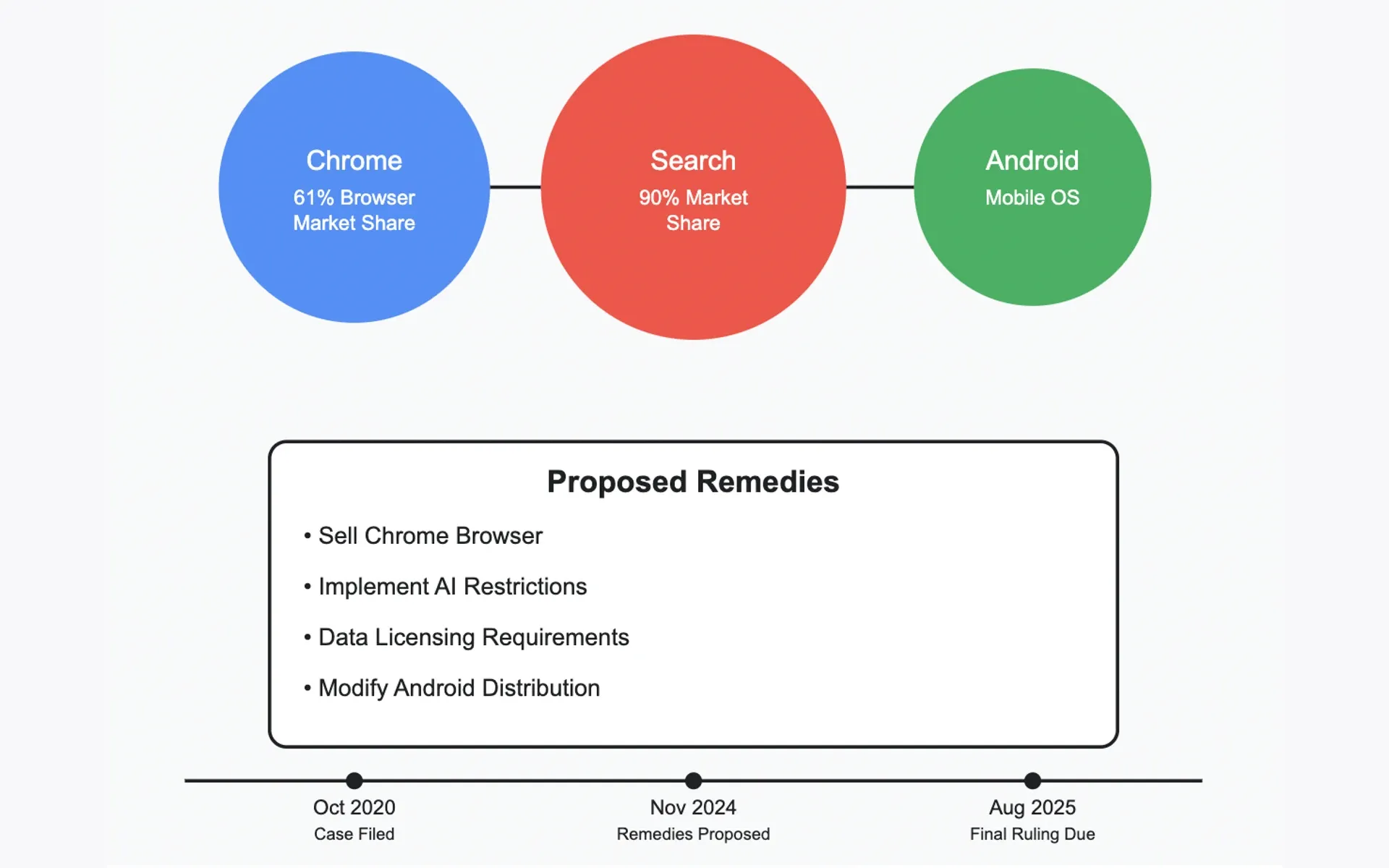DOJ seeks Chrome Sale in historic Google Antitrust remedy proposal
Justice Department to request Google sell Chrome browser and implement AI restrictions as part of landmark antitrust case remedies.

According to Bloomberg, the U.S. Department of Justice (DOJ) is preparing to ask federal judge Amit Mehta to force Google to divest its Chrome web browser, marking a dramatic escalation in the ongoing antitrust battle. The announcement, made on November 18, 2024, comes just three months after Judge Mehta ruled that Google had illegally monopolized the search market.
The DOJ's proposal, which will be presented on Wednesday, encompasses three major areas: the potential sale of Chrome, new requirements related to artificial intelligence, and modifications to Google's Android smartphone operating system. The antitrust officials, working alongside state attorneys general, will also recommend implementing data licensing requirements.
Chrome currently dominates the U.S. browser market with approximately 61% market share, according to StatCounter. The browser plays a crucial role in Google's advertising business, allowing the company to track signed-in users' activity and more effectively target promotions.
Lee-Anne Mulholland, Google's vice president of regulatory affairs, responded strongly to the news, stating the Justice Department "continues to push a radical agenda that goes far beyond the legal issues in this case." She emphasized concerns about potential harm to consumers, developers, and American technological leadership.

The Complex Web of Google's Market Power
The Chrome Browser's Strategic Importance
Chrome serves as a critical access point for Google's search engine and advertising business. According to the documents, the browser's dominance enables Google to gather valuable user data and direct traffic to its services, including its new AI product, Gemini.
Search Market Dominance
According to PPC Land's coverage of the August 2024 ruling, Google controls approximately 90% of the online search market overall and 95% on smartphones. The company's financial commitment to maintaining this position is substantial, with payments of $26.3 billion in 2021 alone to ensure its search engine remained the default option on various platforms.
Distribution Agreements
Judge Mehta's ruling highlighted how Google's exclusive distribution agreements with browser developers, mobile device manufacturers, and wireless carriers effectively foreclosed opportunities for competitors. These agreements, coupled with revenue-sharing arrangements, created what the court called "interlocking and pernicious harms" in markets "indispensable to the lives of all Americans."
The Significance
This case represents the most aggressive antitrust action against a technology company since the Microsoft case two decades ago. The original lawsuit was filed in October 2020 under the Trump administration and has continued under President Biden, demonstrating bipartisan support for stronger tech industry regulation.
The August 2024 ruling found Google violated Section 2 of the Sherman Act by illegally maintaining monopolies in U.S. general search services and U.S. general search text advertising. This set the stage for the current remedies phase, which could fundamentally reshape the digital landscape.
According to court documents, Google paid an estimated $20 billion to Apple in 2022 for default placement on Safari, nearly double the payment made in 2020, which represented 17.5% of Apple's operating profit at the time.
Why This News Matters Now
The proposed remedies represent a watershed moment in tech regulation for several reasons:
- Timing: The proposal comes at a critical juncture when artificial intelligence is reshaping the technology landscape, with Google using Chrome to promote its AI product Gemini.
- Market Impact: According to recent financial data, Google's parent company Alphabet reported $48.5 billion in "Search & Other" revenue for Q2 2024, representing 57% of total revenue.
- Global Precedent: The outcome could influence similar antitrust actions worldwide, as regulators grapple with big tech's market power.
- Consumer Choice: The proposals aim to create more competition in search and browsing, potentially giving users more options and control over their digital experience.
Key Facts
- DOJ will request Google sell Chrome browser
- Chrome controls 61% of U.S. browser market
- Google paid $26.3 billion in 2021 for search default status
- Google has 90% share of overall search market
- Google paid Apple $20 billion in 2022 for Safari default placement
- Case stems from August 2024 ruling finding Google violated antitrust laws
- Judge Mehta's final ruling expected by August 2025
- Original antitrust lawsuit filed October 20, 2020


